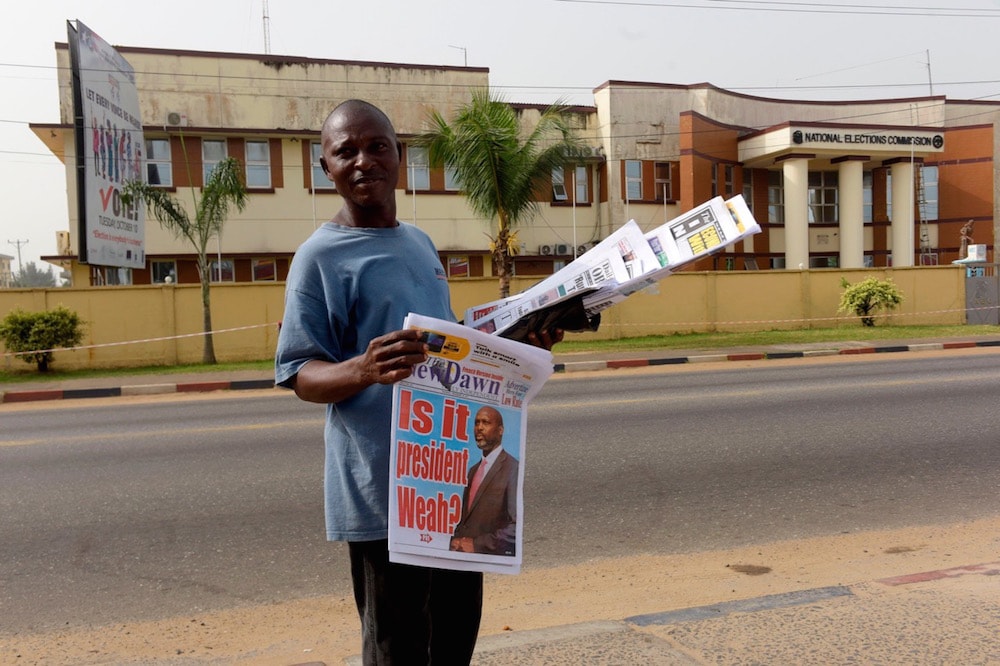While Liberia has, so far, managed to save lives from the worst public health effects of the COVID-19 pandemic, the subsequent reduction of the number of journalists and media institutions covering the Ministry of Information, Cultural Affairs and Tourism (MICAT) regular press briefings and other public news media engagements has drawn clear cut attention around Access to Information and structural vulnerabilities of journalists to ask hard questions into sharp focus.
As a resource-rich information provision platform, the MICAT press briefings provide a decent quality of information sharing to the public, especially for journalists and all of the country’s inhabitants who are consumers of the media.
On March 16, 2020, the Director of Press at the Ministry of Information released a circular that cleared only six media institutions- FrontpageAfrica, Executive Mansion Press, KMTV, Spoon TV, Sam TV, and Okay FM as institutions it had qualified to cover its COVID-19 regular press briefings.
Usually, more than 40 journalists representing about 50 newsrooms from around Monrovia and correspondents of international news outlets converge at MICT for coverage.
The MICAT press briefings, however, are not occasions for journalists to pat themselves on the back for the work they do. Rather, the focus is on how journalists go about reporting the issues of the government that matter to their audiences.
The sharp reduction in the number of journalist turns out to be a major press freedom issue that further flies in the face of access to information even though count 19 of the government’s own “Revised Notational Health Emergency Guidelines to Contain COVID-19”, released on 22 of July, 2020 states that “Official information and communication on the covid-19 shall only be announced by the MOH, NPHIL and MICAT”.
The directive that the Ministry of Health, the National Public Health Institute and the Ministry of Information are the only duly authorized communicators makes more relevant the role of the Information Ministry to corrective information sharing that promotes trust, confidence and awareness.
To keep a fewer number of journalists out of the government’s formal information provision platforms is dangerous because in the face of the COVID-19 outbreak, audiences have been turning to professional journalists like never before.
When journalists cover news conferences, they share content with their audiences. These audiences then react to the news by forming opinions on various talk shows and on all forms of social media to promote the key democratic element of freedom of expression.
Notwithstanding, the permission to have more journalists cover MICAT events promotes diversity of views through various forms of questioning that seeks the truth and holds the power that be accountable.
By doing this, truth telling can be enhanced in the public sector when journalists are given a change to report a fair and reliable account of the news they cover and ensure transparency, because transparency allows the public to contribute to the process of finding the truth, influencing and enhancing democracy.
Also, the inclusion of Sam TV, a government backed outlet and the Presidential controlled Executive Mansion online broadcaster (Executive Mansion Online) raises more questions about why private institutions that are most listened to were left out of the arrangement.
Misinformation and spread of COVID-19
A study has revealed a so-called “infodemic” exacerbated COVID-19 through the spread of rumors and conspiracy theories. The Research looked into false notions such as drinking bleach and eating cow dung.
Equally so, misinformation about the coronavirus has led to the deaths of at least some 800 people according to the WHO and that possibly more, a newly published study in the American Journal of Tropical Medicine and Hygiene showed.
From losing their eyesight to the loss of life, the spread of rumors, stigma and conspiracy theories exacerbated the suffering of thousands of people across the globe.
The Liberian government itself, recognizing the impact of the drawbacks the spread of misinformation brings to its efforts to fight the spread of the virus, setup a special communication team in its incident management system with the task of managing COVID-19 Communications.
Hassan Kiawue, the head of the government’s risk communication team even admitted in late July that “misinformation was embarrassing the fight against Covid-19”. When pressed by the host of the show on why the number of journalists covering the Ministry of Information regular briefing was slashed from about 40 to 8, he responded that it was a ‘public health measure”.
Kiawue however admitted that government needed to reverse the regulation to allow more journalists to attend the press briefings.
Clearly, there is a need to reverse the government’s policy for six media institutions to cover the major news event in the country post COVID-19. More journalists must be allowed to cover the press conferences of the Ministry Information to help with information dissemination because Covid-19 has reminded people of many things they had taken for granted.
It has made plain the importance of good governance, the value of trust in leaders and institutions, and the solace and strength that families and communities provide. It has also highlighted the critical role that a credible and reliable media plays in the health and well-being of societies.
Audiences have surged due to basic lockdown restrictions. And so, real news matters if people are to make sense of the bewildering developments around them especially when the country has not recorded cases of the coronavirus for nearly two months running.
Increased report of the government’s handling of the COVID-19 crisis in a country where truth telling and transparency are a luxury, pluralized, credible journalism is critical if people are to have informed debates about where they might be headed in a post-pandemic Liberia.
The government must now engage newsrooms that feed listeners, viewers and readers to help rally communities and people in a time of wrenching change and promote freedom of speech and basic access to information for the entire population.




